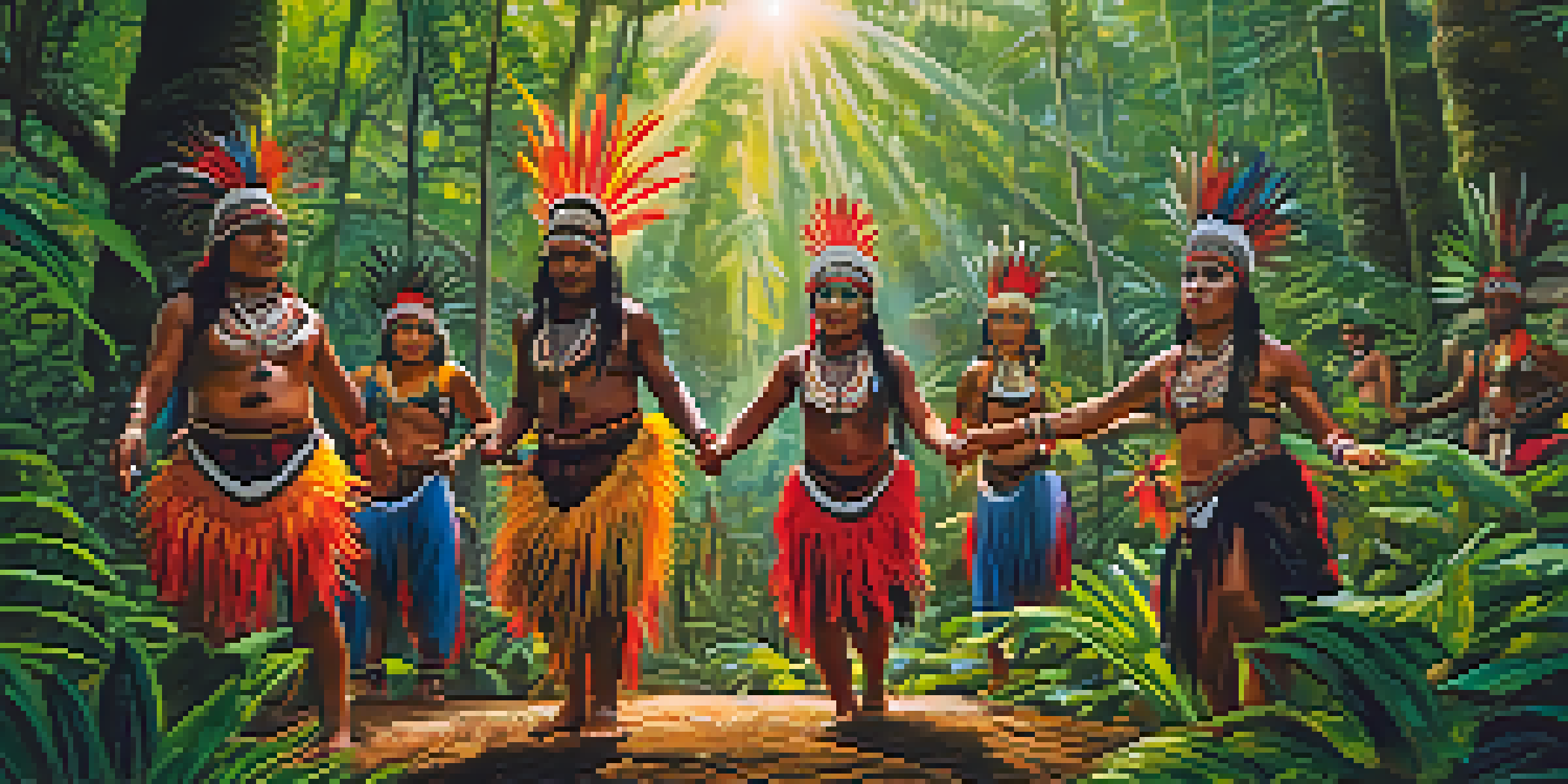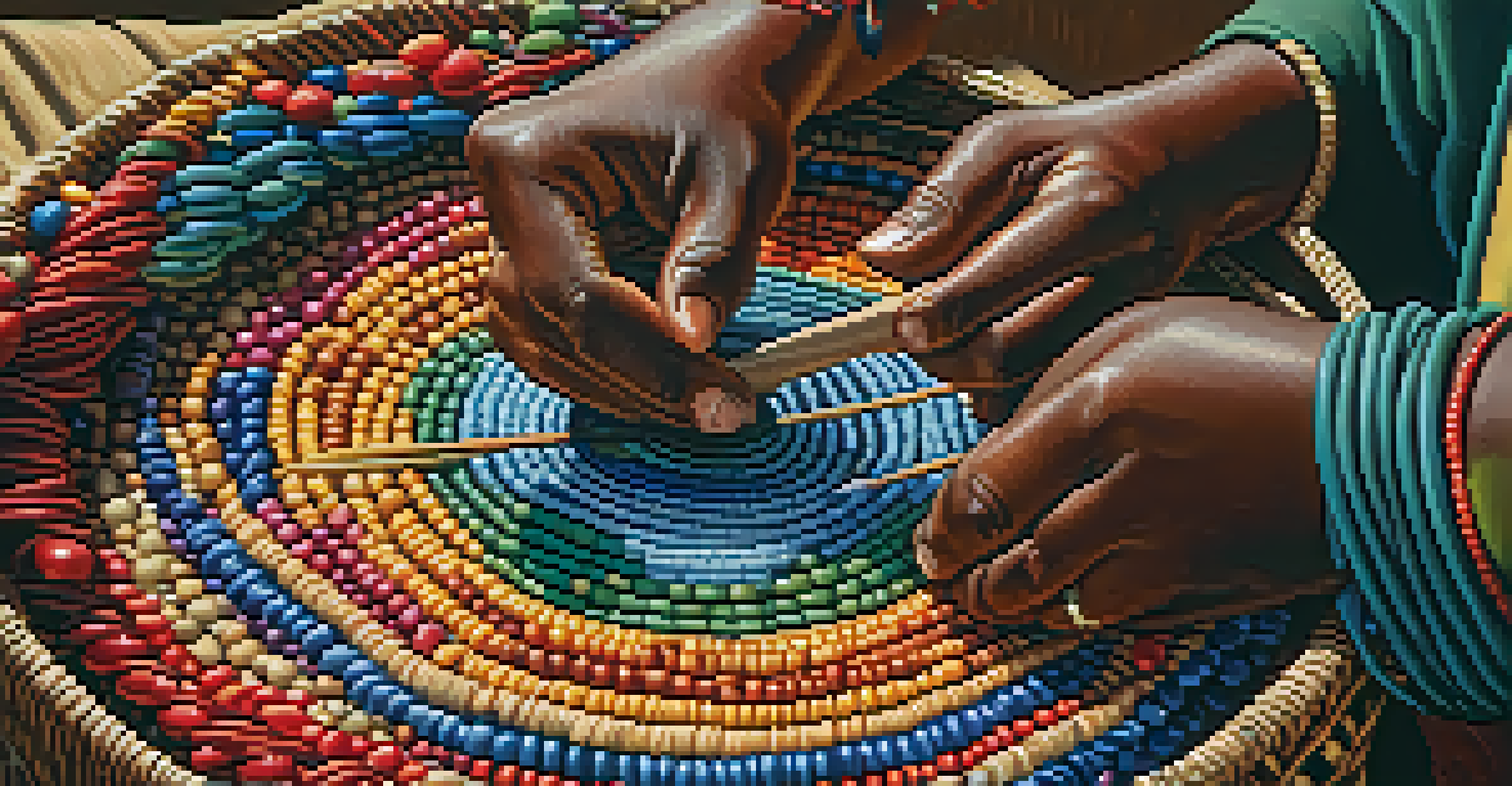Exploring Brazil's Indigenous Cultures: A Rich Heritage

An Overview of Brazil's Indigenous Peoples
Brazil is home to over 300 Indigenous tribes, each with its own distinct language and customs. These groups range from the well-known Yanomami in the Amazon rainforest to the Guarani, who inhabit various regions. Despite their diversity, they share a deep connection to the land and a rich cultural heritage that has survived centuries of change.
Indigenous peoples are the guardians of the planet's biodiversity, and their knowledge is essential in preserving the environment for future generations.
The Indigenous peoples of Brazil have inhabited the land for thousands of years, long before European contact. Their knowledge of the environment is profound, encompassing sustainable agricultural practices and medicinal uses of plants. Understanding their way of life is crucial for appreciating not only their culture but also their contributions to biodiversity.
Today, these communities face numerous challenges, including land disputes and cultural assimilation. However, many Indigenous leaders are actively working to preserve their languages and traditions, ensuring that their rich heritage continues to thrive in modern Brazil.
Cultural Practices and Traditions
Indigenous cultures in Brazil are vibrant and varied, often expressed through art, music, and dance. For instance, the intricate body painting and ceremonial dances of the Tikuna tribe are not just forms of expression; they hold deep spiritual significance. Each pattern and movement tells a story, connecting the performers to their ancestors and the natural world.

Storytelling is another vital aspect of Indigenous cultures, where oral traditions pass down history and morals through generations. These stories often feature animals and nature, reflecting their deep respect for the environment. Engaging with these narratives invites us to view the world through the lens of Indigenous wisdom.
Diverse Indigenous Cultures in Brazil
Brazil's Indigenous peoples, with over 300 tribes, possess unique languages and customs that reflect a deep connection to their land.
Craftsmanship is also an important cultural practice, with many tribes creating beautiful artifacts using traditional techniques. From handwoven baskets to intricate beadwork, each piece serves a purpose, whether functional or ceremonial. Supporting these artisans not only helps preserve their skills but also fosters appreciation for their cultural heritage.
The Role of Spirituality in Indigenous Life
Spirituality is deeply woven into the fabric of Indigenous life in Brazil, often intertwined with nature and the cosmos. Many tribes believe in a harmonious relationship between humans and the environment, where every element of nature holds significance. This perspective fosters a sense of responsibility toward the land and all living beings.
The preservation of Indigenous cultures is essential not only for their survival but for the enrichment of humanity as a whole.
Rituals and ceremonies are essential in expressing their spirituality, often marking important life events such as births, marriages, and deaths. These practices can involve offerings, songs, and communal gatherings, reinforcing community bonds. They also serve as a reminder of the interconnectedness of life and the importance of preserving their traditions.
Through these spiritual beliefs, Indigenous peoples advocate for environmental stewardship. Their understanding of the ecosystem inspires efforts to combat deforestation and promote sustainable practices. This wisdom can offer valuable insights as the world grapples with climate change and environmental degradation.
Language and Communication Among Tribes
Language is a cornerstone of Indigenous identity, with over 150 different languages spoken among Brazil’s tribes. Each language carries unique expressions, cultural concepts, and worldviews that reflect the tribe's heritage. Sadly, many of these languages are endangered, as younger generations are often encouraged to adopt Portuguese.
Efforts are underway to revitalize these languages, with community programs and educational initiatives aimed at teaching the youth. By embracing their linguistic heritage, Indigenous peoples can strengthen their cultural identity and ensure that their traditions endure. Language plays a vital role in connecting individuals to their history and community.
Challenges to Indigenous Communities
Indigenous tribes face significant threats from land rights issues, cultural assimilation, and health disparities, exacerbated by external pressures.
Moreover, Indigenous languages offer valuable insights into biodiversity, as many terms describe local flora and fauna that may not have direct translations in Portuguese. This linguistic diversity enriches our understanding of the environment and highlights the importance of preserving both language and culture.
Challenges Faced by Indigenous Communities
Despite their rich heritage, Indigenous communities in Brazil face significant challenges today. Land rights remain a contentious issue, as many tribes struggle to protect their ancestral territories from deforestation and mining. The encroachment of agriculture and urbanization threatens their way of life and access to resources.
Cultural assimilation poses another challenge, with younger generations often torn between traditional practices and modern influences. This shift can lead to the loss of languages and customs, making cultural preservation critical. Indigenous leaders are advocating for their rights, striving to ensure that their voices are heard in discussions affecting their future.
Additionally, health disparities are prevalent, with many Indigenous peoples lacking access to adequate healthcare. This situation has been exacerbated by the COVID-19 pandemic, highlighting the vulnerability of these communities. Addressing these challenges requires collaboration and respect for Indigenous knowledge and rights.
Indigenous Contributions to Brazilian Society
Indigenous cultures have made significant contributions to Brazilian society, particularly in areas such as agriculture and environmental conservation. Many staple crops, including cassava and various fruits, were domesticated by Indigenous peoples long before European arrival. Their agricultural practices promote biodiversity and sustainable farming methods that are increasingly relevant today.
Moreover, Indigenous peoples are at the forefront of environmental activism, advocating for the protection of the Amazon rainforest and other vital ecosystems. Their traditional ecological knowledge offers valuable strategies for conservation and resource management. By integrating these practices into broader environmental policies, society can benefit from their insights.
Indigenous Contributions to Society
Indigenous cultures have significantly influenced Brazilian agriculture, environmental conservation, and the arts, enriching the nation's cultural landscape.
Culturally, Indigenous art, music, and literature have influenced contemporary Brazilian culture. From vibrant festivals to storytelling that resonates with modern themes, their heritage enriches the cultural tapestry of the nation. Recognizing and celebrating these contributions is essential for fostering appreciation and understanding among all Brazilians.
The Future of Brazil's Indigenous Cultures
The future of Brazil's Indigenous cultures lies in the balance between tradition and modernity. While challenges persist, there is a growing movement toward cultural revitalization and political empowerment. Younger generations are increasingly taking pride in their heritage, seeking to reclaim and promote their identities.
Education plays a critical role in this process, with more initiatives aimed at teaching Indigenous languages and cultural practices in schools. These efforts not only support cultural preservation but also foster respect and understanding among non-Indigenous populations. Engaging in dialogue about Indigenous rights and contributions can strengthen societal bonds.

As awareness of Indigenous issues rises globally, there is hope for increased support and collaboration. By standing in solidarity with Indigenous communities, society can work towards a future that honors their heritage and ensures their voices are heard. This journey is not just about preserving history; it’s about creating a vibrant, inclusive future for all.